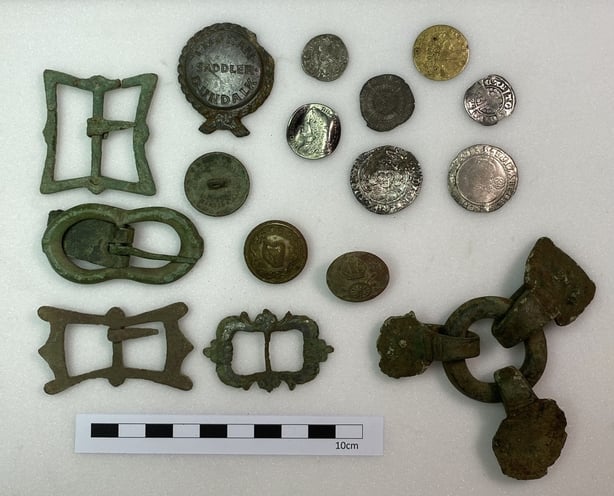The National Museum is reminding the public that the discovery of archaeological objects must be reported by law.
It follows the recent conviction of a man before Dundalk District Court for the possession of archaeological artefacts.
Silver medieval coins were among the more than 60 items recovered by gardaí as part of an investigation into the possession of unreported archaeological artefacts in Co Louth.
The investigation led to the conviction of a man under Section 4 of the National Monuments Act before Dundalk District Court last month.
The case dates back to 2019 and the objects were discovered some time before then.
It is believed some of the artefacts may have been found in the Dundalk area.

Welcoming the outcome of that case, the National Museum said that all archaeological objects "without a known owner" are the property of the State.
The museum is now reminding people that the discovery of archaeological objects must be reported by law and warned against the unlicensed use of metal detectors to search for archaeological artefacts.
The use of metal detectors to search for artefacts and the reporting of their discovery are both regulated under the National Monuments Act 1930-2014.
Under Irish law, people are required to apply for a license to use metal detectors to search for archaeological objects.
The National Museum said this is to "protect our nations heritage" and that the unregulated use of detection devices "poses a serious risk to Ireland's archaeological heritage".
As part of the National Museum's role to "protect Ireland’s portable archaeological heritage", it routinely monitors online postings that may suggest the unlicensed searching for archaeological objects, and staff assist gardaí with investigations.
It said that in this particular case, social media posts had alleged that a person was involved in the "unlicensed use of a metal detector to search for archaeological objects and may have been in possession of these objects".
Among the items seized were silver medieval coins, part of a medieval horse harness and a detection device.
The individual was convicted of the possession of archaeological objects and was fined €1,000.
'Priceless archaeological heritage'
The Keeper of Antiquities at the National Museum of Ireland described the outcome of the recent court case as "significant".
Maeve Sikora said that she hoped this judgment would lead to greater awareness of the laws in place to protect Ireland's irreplaceable and unique archaeological heritage and the sanctions for breaking those laws.
"Ireland's archaeological heritage belongs to everyone. Artefacts have survived for centuries and often millennia and should be available to be studied and enjoyed for generations more to come," she said.
"No individual has the right to unnecessarily risk the preservation of our priceless archaeological heritage," she added.
The public is now being urged to be vigilant and to report any potential unlicensed metal detecting to An Garda Síochána.
If someone finds an archaeological object, they must report it to the National Museum within 96 hours.
Ms Sikora said that the museum could deal with reports from the public on a weekly basis and she thanked the finders who do report their discoveries.
"We sincerely thank An Garda Síochána Dundalk Garda Station for their support in investigating and obtaining this conviction. We also want to thank the the general public for their continued vigilance in safeguarding our portable heritage," she said.
Members of the public can report their finds by emailing antiquitiesdo@museum.ie or by phoning 01-6777444.
The seized items that were at the centre of this recent case in Dundalk are now in the possession of the National Museum, which is continuing its work of analysing and researching them.







